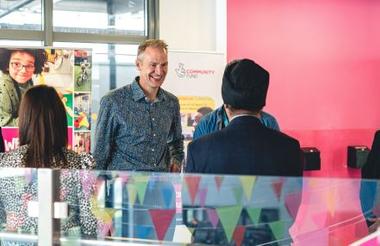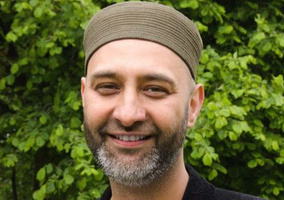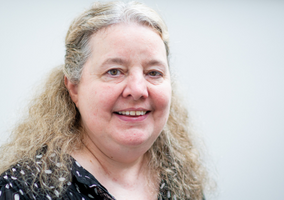David Knott, chief executive of the National Lottery Community Fund (NLCF), comes from a family with a tradition of public service that dates back to the 18th century.
According to the Guinness World Records, the Knotts are the longest-serving family of lighthouse keepers. William Knott got into the profession in 1730 and then passed it on through five generations until 1910.
Knott, however, grew up in Nottingham in a household where his parents were teachers. His mother taught in a primary school while his father taught German and French in a secondary school.
“I've always been guided by social purpose and making a difference in life,” Knott says.
“The long tradition of public service, for 300 years, in one form or another, is something that’s very core to my own identity.”
The common thread of service to others can be traced back throughout his career in the public sector and civil service.
Previously, Knott worked as an economic adviser in the prime minister’s strategy unit under Tony Blair, providing advice on economic and public sector reform programmes in education, health and youth policy.
More recently in 2017, he served as a director in the Office of Civil Society (OCS) at the Department for Digital, Culture, Media and Sport (DCMS).
Knott first got his foot into NLCF’s door as a senior adviser in October 2020 on a 12-month secondment from his role at OCS.
He then took over as the interim chief executive of NLCF in June 2021 and subsequently became the permanent chief executive in October of the same year.
Three years in as the permanent boss, Knott said it is a privilege to see NLCF’s staff and colleagues have real and long-term impacts on the ground.
“There’s a huge amount of passion, dedication, purpose and real professional expertise,” he says.
“Most of the ideas that are going to help us respond to the challenges of the 21st century and are going to be found within communities and the voluntary, community and social enterprise sector.
“That’s where I see the real innovation and dynamism. And so, I feel like I’m part of – and have the privilege to lead – an organisation which is funding the support, energy and momentum that’s really going to be the driving force of the social change and response we need to meet those big challenges of our time.”
In June 2023, NLCF launched its seven-year strategy, It starts with community, which aims to deliver at least £4bn of funding to communities across the UK by 2030.
The types of funding it offers includes accessible grants from £300 to £20,000, as well as longer-term grants and strategic investments with partners.
The £4bn target by 2030, however, is a “conservative figure”, Knott says, adding that NLCF has distributed around £900m of funding so far.
“We’re at the end of chapter one of the new strategy,” he says.
“There’s a lot more of the book to write but I’m really pleased with the start and the response I’ve seen from organisations and partners and grant holders that we work with to rise to the challenge and opportunity that the strategy identifies and sets.”
NLCF is celebrating its 30th anniversary in November and is set to incorporate new strategies on collaboration, partnership and long-term funding.
“There might be some surprises and twists and turns in the years ahead,” Knott adds. “You might have to wait and see.”
Leadership in action
The steady momentum of today at NLCF under Knott’s leadership did not come easy.
Knott inherited a list of tricky issues when he stepped in as the chief executive. He joined at a time when NLCF was channelling a significant amount of work and extra funding towards pandemic emergency responses along with staff working remotely.
He still remembers when he first addressed the organisation virtually through a live stream from his room: “I was getting to know a new organisation, new teams and new people, not being able to meet face to face. I found that it was such a challenging time to arrive when we were in that operational response.”
Moreover, it was also during a time when NLCF was tainted by a toxic work culture.
A November 2021 report, commissioned by the DCMS and carried out before Knott became the permanent chief executive, showed that one in three people witnessed or experienced bullying, harassment or discriminatory behaviours while working at NLCF.
“Many of our colleagues hadn’t had the experience you should rightly expect in an organisation, and it was a really challenging report to us,” Knott says.
“It required decisive and personal leadership to say: ‘We need to move on as an organisation and that needed specific actions.’”
The organisation subsequently established a colleague council that is made up of a group of employees from different offices and grade levels of responsibility across the organisation.
The council is embedded in the senior management team, Knott says, so there is always a colleague’s voice inside the highest level of decision-making at NLCF.
“We were very clear that this is an important part of what we’re doing and how we’re doing that.
“We’ve also got values around compassion. As we all know, we’ve got lives outside of work and we should treat each other with the dignity and respect that we all expect.
“A big personal drive for me has been to embed a better and stronger way of working, whether that’s in our strategy, through our governance or inside our operations, so that we can be the very best organisation.”
A vital role in the sector
In recent months, charities and grantmakers have seen a surge in demand for services, resulting in charity closures and funders pausing their grant programmes to reset their operations.
Knott comments: “It shows that charities are under acute and unprecedented challenge.
“It says something about the importance of funders and foundations, and it’s a timely reminder to us of the vital role that we play in this sector.”
NLCF and its programmes will remain open for all organisations, he says, adding that some applications have simple processes that take no longer than an hour to apply.
In May 2024, NLCF announced its corporate plan 2024-27 to complement its strategy.
The corporate plan is the largest expansion of NLCF’s grassroots funding in its history, hoping to reach 80% of local communities across the UK.
It has a target of giving more than 50% of all grants to communities experiencing greatest poverty and disadvantage.
It will also dedicate 15% of funding for environmental sustainability and support projects that take the environment into consideration even when it is not their main focus.
The organisation gives 95% of its budget out to make awards, Knott says.
“One of the challenges is that we want to be able to fund everything, but we have to say we can’t fund everything. We have to make choices.”
There is a misconception that NLCF only supports project-based funds, he points out, but it does distribute non-project funding as well.
“We absolutely get the value of social infrastructure. We will fund social infrastructure and capacity building. We will fund work to help grow evidence, implement and support others. All of our funding streams reflect that balance.”
At the end of the day, however, NLCF has a strong strand and ethos of prioritising direct, visible impacts that every community should benefit from the funds it provides.
Up until August this year, Knott says NLCF had already funded more than half of all local communities across the UK, each community with less than 9,000 in population, showing tangible impacts it has on the grassroots level.
“I’m unapologetic about that focus and why we have that because for me it is the core purpose of the National Lottery,” he adds.
Knott keeps a picture of the Eddystone Lighthouse on his desk, where his great-great-great grandfather George once worked as the principal keeper between 1861 and 1866.
The lighthouse speaks to him. He says: “There's something about its guidance helping boats and ships sail freely, and maybe it’s like that with our role here at the National Lottery Community Fund.
“We don’t see every impact and difference that we’re making on the ground, but we’re almost like a lighthouse, trying to show some of the way and provide the environment in which this sort of activity can happen.”
Related Articles












